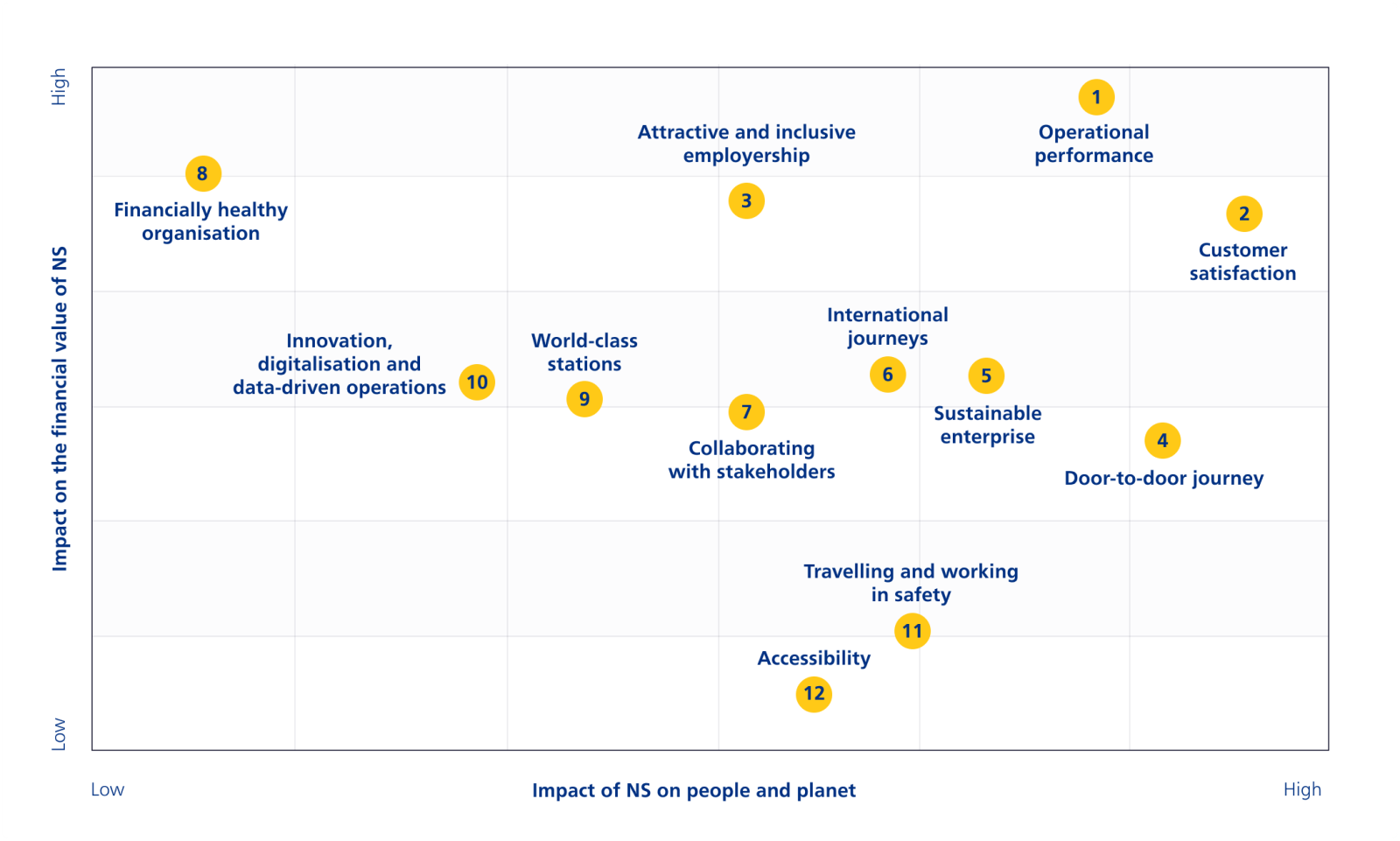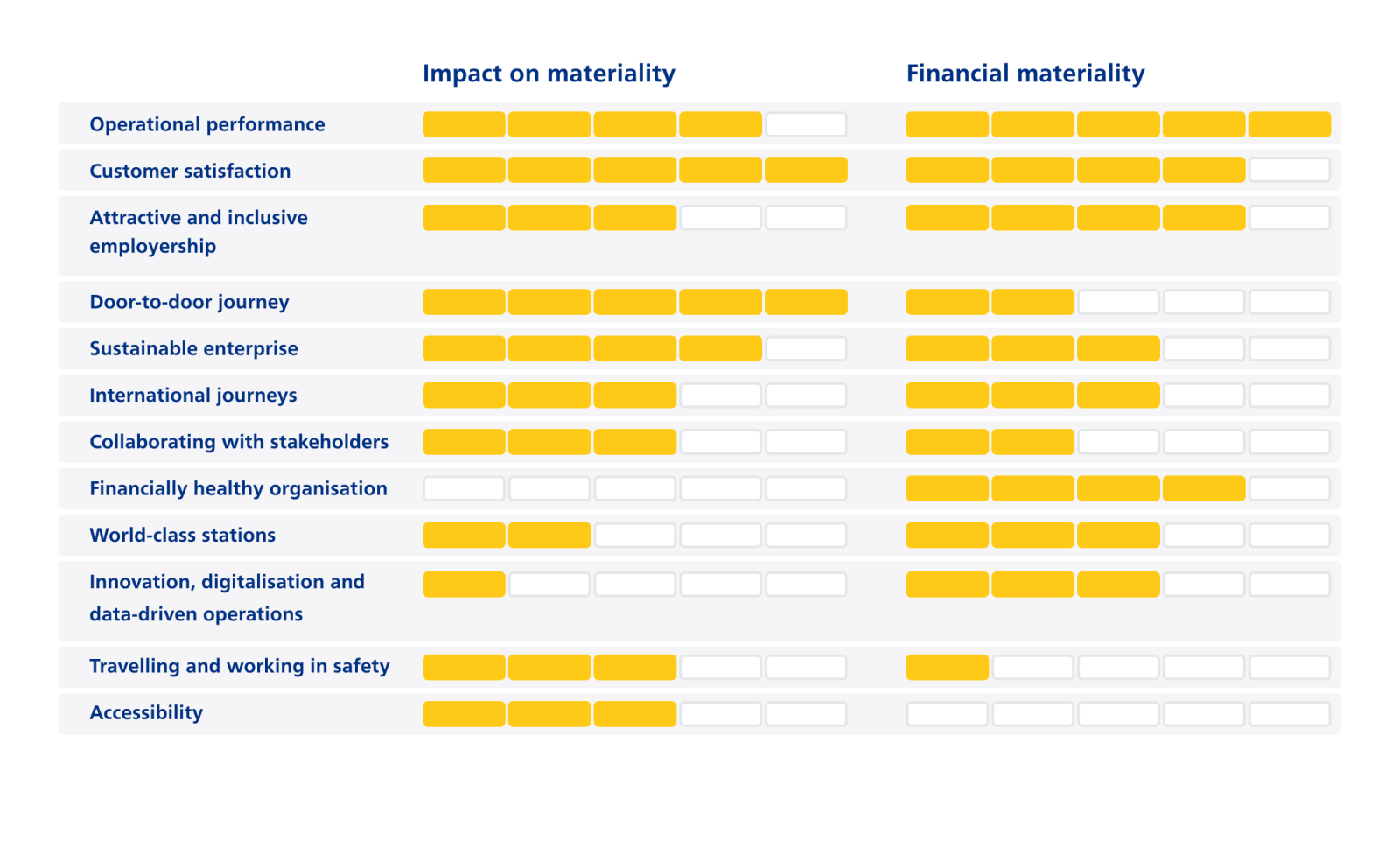Notes to the material themes
In the years up to and including 2021, NS filled in the material relevance matrix on the basis of our impact on people and planet and the relevance for our stakeholders. We recalibrated our material topics in 2022. In addition, we apply a concept known as ‘double materiality’, in anticipation of new regulations under the Corporate Sustainability Reporting Directive (CSRD). The CSRD is an extended version of the existing Non-Financial Reporting Directive (NFRD), whose current scope does not include NS. The purpose of the CSRD is to improve the quality and comparability of non-financial information in the annual reports of listed companies and other large or medium-sized businesses, such as NS. The CSRD will take effect in 2024. This means that in 2026, NS's report for 2025 will have to be fully compliant with the CSRD. Double materiality is mandatory under the CSRD and involves a combination of impact materiality and financial materiality.
The material topics provide insight into the impact of NS on societal issues (impact materiality) and, conversely, the way in which such issues influence the development, performance and position of NS (financial materiality). This is an extension of former analyses, in which the key focus was on the relevance of topics to external stakeholders. Double materiality exclusively concerns topics in connection with which NS has an impact on society or topics with a potential impact on NS. We have included both positive and negative impacts in this regard. Examples include the provision of sustainable travel options in the Netherlands and abroad, a positive impact on employment in the Netherlands, or a potential negative impact on privacy due to the increasing use of data-driven working methods. We have also explored potential opportunities and risks associated with the various impacts. As such, the results of this material relevance analysis provide a more comprehensive picture of the relevant impacts of and on our organisation.
In preparation for the current list of relevant impacts and priorities, this year we asked both internal and external stakeholders for their input. In collaboration with various internal stakeholders, for each material topic we identified the possible positive or negative impacts of NS on people and planet and human rights, for example, and which developments in society might pose an opportunity or a risk for the development, performance or position of NS. We then asked our most important internal and external stakeholders (administrators and official representatives, partners, consumers’ associations, NGOs, suppliers, ProRail, trade unions and political representatives) to prioritise the various impacts based on their perception of NS's impact on people and planet and of the impact on NS's financial value.
For all material topics included in the matrix, we report on objectives and results. The matrix has been validated by the Executive Board.
Tightening definitions
In 2022, NS tightened the definitions of its material topics. Compared with 2021,12 of the total of 17 material topics have been included in the double materiality matrix. ‘Risk management’, ‘Integrity & compliance’ and ‘Abellio’ are deemed to be of less importance by stakeholders and were not included this year. ‘Sustainable enterprise’ is a new topic in the matrix, a combination of ‘Contribution to the Dutch Climate Agreement’ and ‘Responsible procurement’’from 2021, as responsible procurement is part of the sustainable enterprise strategy. We have combined the material topic of ‘Designing and sharing knowledge on mobility’ with ‘Collaborating with stakeholders’ owing to the overlap between these two. We have expanded the scope of ‘Innovation’ to cover ‘Innovation, digitalisation and data-driven operations’ to reflect internal and external developments in IT.
Thematic shifts
‘Operational performance’ has remained the most relevant material topic for NS and its stakeholders. This concerns the extent to which NS is committed to maintaining and further improving its operational performance, including during the COVID-19 period in the first months of 2022 and the staff shortages and timetable reduction in the second half of that year. The topic of ‘Attractive and inclusive employership’ has risen dramatically compared with 2021, which is mainly due to its financial impact on NS. The increase may be a consequence of the strikes in August and September, which coincided with our request among stakeholders to rank the material topics. For our stakeholders, NS has the greatest impact on society through the topic of ‘Customer satisfaction’. This is how NS meets the core needs of passengers with respect to their travel experience. Opportunities to improve customer satisfaction levels include a more effective spreading of passengers by seeking collaboration with employers and educational institutions, technological innovations to give passengers more control over their own journey, and the introduction of new rolling stock. Risks in connection with this topic include maintenance or repair works and other types of service disruption.
‘Financially healthy organisation’ is the topic where NS's impact on society is smallest. It may have a positive impact through investment in improving NS's operational performance, the affordability of train fares, offering better terms of employment and by investing in rolling stock. The impact is negative however if NS's financial performance fails to meet expectations and the company is unable to invest in the quality and sustainability of its operational performance and in staff. Finally, the topic of ‘Safe Journey’ has fallen sharply compared with 2021, due in particular to its limited impact on our financial performance. Technological developments in the field of predictive data and enhanced collaboration on personal safety with partners in the chain present opportunities in connection with this topic. They will help NS identify locations where potentially unsafe situations may occur and take preventive measures.
Evaluation of the management approach
We use our results and objectives in the annual evaluation of our management approach to the various material topics. In this connection, we also discuss the effectiveness of our actions and consider any lessons we may learn from the results achieved to implement improvements where necessary. For ‘Operational performance’ (1), ‘Customer satisfaction’ (2) and ‘Door-to-door journey’ (4), for example, we use the performance indicators from the 2022 Rail Transport Franchise. For the other material topics we use our own performance indicators. In addition, we also try to manage our own positive and possibly negative impacts on the various topics. The objective is to increase our positive impact on people and planet where possible, and mitigate and reduce our negative impacts. We report on any adjustments to our management approach that result from the evaluation, and for each material topic provide insight in the way we manage our impacts and mitigate them where necessary.

# | Material topics 2022 | Definition |
1 | Operational performance | The extent to which NS is committed to achieving operational performance agreements on the main rail network and HSL South, such as punctuality and seat availability. |
2 | Customer satisfaction | The extent to which NS meets the core needs of travellers with respect to their travel experience. |
3 | Attractive and inclusive employership | The extent to which NS can offer its current and future employees an attractive (employment conditions and development) and inclusive (open and safe, diversity, equality) working environment where everyone can be themselves, and encourages being a good employer in the chain. |
4 | Door-to-door journey | The extent to which NS facilitates customised door-to-door travel for all public transport passengers in all regions of the Netherlands. Where possible with our own physical and digital services, but also through other providers. |
5 | Sustainable enterprise | The extent to which NS contributes to the climate (agreement) by offering sustainable mobility and making it more sustainable by operating fossil-free, circular and green business practices and accepting its responsibility to make the chain more sustainable. |
6 | International journeys | The extent to which NS works together with partners and implements improvements to international travel, among other things to offer an attractive alternative to short-haul flights and cars. |
7 | Collaborating with stakeholders | The extent to which NS assumes a coordinating role in the mobility sector through reliable, open and accessible cooperation and knowledge sharing with (inter)national and regional stakeholders in order to shape sustainable mobility in the Netherlands. |
8 | Financially healthy organisation | The extent to which NS is able to achieve a financial return now and in the future so that it can continue to invest in improving its services. |
9 | World-class stations | The extent to which NS is committed to working with our partners in the region to provide world-class stations by creating functional and valued hubs for mobility and quality of life. |
10 | Innovation, digitalisation and data-driven operations | The extent to which NS continues to innovate, digitalise and provide data-driven operations in order to optimise our services, the quality of our products and efficient business operations and thus increase passenger satisfaction with their journey, now and in the future. |
11 | Travelling and working in safety | The extent to which NS is committed to safety for passengers, colleagues and employees of partners. |
12 | Accessibility | The extent to which NS is committed to seamless travel in order to make its products and services available and accessible to all. |
